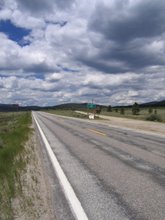Following a reading of excerpts from Exodus 2-4.
"Here I am, Lord. Please, send someone else."
Moses says both these things, and because he does, he is perhaps a very approachable model for understanding our vocation, the work we are called to do with our lives—not our careers, but our lives.
Moses was born to a Hebrew mother, but because Pharoah was engaging in genocide against the Hebrews, his mother set Moses out in a basket in the river. He was found by Pharoah’s daughter who then hired his mother to nurse him. His mother must have been a formative influence: while Moses was raised as an Egyptian, he never forgot his Hebrew roots.
When I read the story, I see a Moses who is angry at the oppression of his people. He sees an Egyptian beating a Hebrew—and maybe his anger overcame his self-interest of keeping your head down (and depending on your perspective, his anger may have overcome his better judgment). He saw this beating and he killed this Egyptian, and is then forced to flee.
Moses doesn’t put up with much—well, he puts up with a lot later on as a leader, but he’s consistently standing up for the oppressed. He’s fled now to another land, sitting a well. He sees some women trying to water their flocks get chased away by some other shepherds; he defends the women, and then marries one. That worked out pretty well for him.
And so, Moses is tending his father-in-law’s flocks when the passage we just read began. He sees a burning bush, hears God calling him, hides his face in fear. This may be Moses’ first encounter with God—we don’t know much about his religious life beforehand. Moses sees something amazing, he must be rejoicing inside that God is finally going to act on behalf of his oppressed people. Until Moses gets the news: God’s going to send Moses to Pharaoh. “Who am I to go to Pharaoh”—seems like a legitimate question. “What if they don’t believe me”, ok.
But as God outlines the plan, Moses ain’t buying it. At the end, he’s reduced to “God, I’m not that well spoken.” When that doesn’t work, I think he’s finally honest: O my Lord, please send someone else.
Many of us are in a similar situation. Perhaps there’s no burning bush, but there’s a tug on our hearts—God is calling us to do something. I feel it sometimes: I’m too weak, too busy, too tired, not good enough. And these are legitimate worries, but they’re hiding something else. I just really don’t want to do it.
God knows our limitation—there’ll be help we can draw on, just as God gave moses signs and aid in the form of his brother Aaron. But, “send someone else”—there is no one else. We’re it. We the church are God’s hands. You and I have each been given our own calling: there’s no one who can do your life’s work.
We will fail along the way, miss the mark, just like Moses did—things may seem to go very badly, we’ll have self-doubt, others will question our work. For someone who didn’t want the job, couldn’t speak very well, got so frustrated he smashed the ten commandments, Moses did pretty well with his life. And so we too we may do pretty well in life, if we stay in touch with God, with that burning bush moment, to sustain us on the journey that is our life.
Amen.
Monday, May 25, 2009
Moses: Here I am Lord, Please send someone else.
Labels:
biographies,
exodus,
hierophany,
moses,
reflections,
vocation
Subscribe to:
Post Comments (Atom)

No comments:
Post a Comment